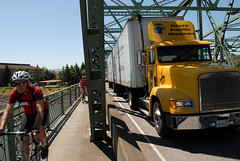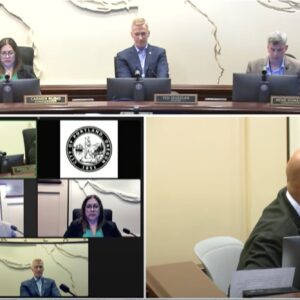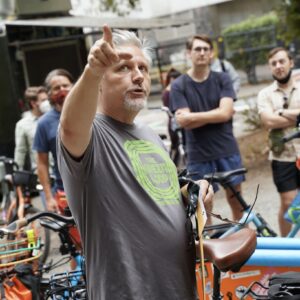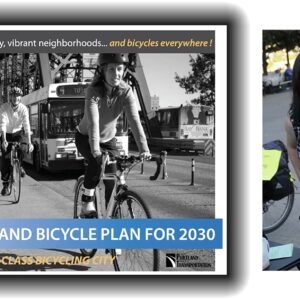“It is unacceptable to the BTA to consider overturning our current policy… The Port [of Portland]… wants this money for highway/road projects. Now is the time to say no.”
— Gerik Kransky, BTA
A funding fight is brewing at Metro over how the regional planning agency should allocate nearly $38 million in federal funds. Unlike the vast majority of transportation funds fought over by various regional interest groups, these funds are “flexible,” meaning they can be spent on nearly any type of project. With scarce dollars in play these days, the competition to snag them is intense.
The $37.78 on the table at Metro is a portion of $147 million in “regional flexible funds” they will dole out through the federal government’s Metropolitan Transportation Improvement Program (MTIP) for the years of 2016 – 2018.
The last time this issue came up, in summer of 2010, it led to a pitched battle between bike and freight advocates. In the end, Metro came down — by a narrow vote of 7-6 — on the side of active transportation. In a historic decision, Metro’s powerful, 17-member Joint Policy Advisory Committee on Transportation (JPACT) voted to spend 75% of regional flexible funds on “Active Transportation/Complete Streets” projects and 25% on “Green Economy/Freight” projects.
Each time these funds come up for allocation, Metro looks to JPACT to tell them how to allocate the money. Not surprisingly, the Bicycle Transportation Alliance (BTA) would very much like to see a similar allocation this time around; but other powerful players around the table have different ideas.
Last month, Metro’s news department reported that the mood among many JPACT members was toward a new focus on “jobs, jobs, jobs” and that, “Many seemed reluctant to go back and have the tough 75-25 percent conversation over again.” Washington County Commissioner (and JPACT member) Roy Rogers said he wants to reverse the 75-25 split and give the lion’s share to freight projects. Another JPACT member, Clackamas County Commissioner Ann Lininger, said, “We need to focus our transportation resources on investments that are going to create significant jobs benefits and economic opportunity benefits.”
And make no mistake about it, while you and I understand that bike-centric projects are not mutually exclusive with projects that promote jobs and economic development, that is indeed how some JPACT members see it.
Metro has laid out three options for how to allocate the $37.78 million that’s in play. Only two of them are currently being discussed: Option 1 would maintain the 75-25 split where Active Transportation/Complete Streets gets the majority of funding, and Option 3 would introduce a host of new project categories into the mix. Option 3 is where major political muscle from representatives on JPACT from the Port of Portland, the Oregon Department of Transportation (ODOT), and others are putting their (considerable) weight.
The BTA’s lead advocate, Gerik Kransky, fears the worst. He sees this JPACT discussion as an attempt to scuttle the historic funding levels he helped earn for bike-friendly projects the last time around. “It is unacceptable to the BTA,” he wrote on their blog last week, “to consider overturning our current policy commitment to spending 75% of the total funds on active transportation and complete streets projects and 25% on freight projects.”
Kranksy has some support in his corner and he’s hoping to build it into a strong coalition by tomorrow’s big JPACT meeting where this funding discussion could be decided. Kransky says he has lined up support from the American Association of Retired People (AARP), the Westside Transportation Alliance, Upstream Public Health, the Willamette Pedestrian Coalition, Coalition for a Livable Future, 1000 Friends of Oregon, and others. Mayor Sam Adams (a JPACT member) has also stepped up in support of Option 1 and wrote a letter to fellow members stating the City of Portland supports continuing the 75-25 allocation in favor of Active Transportation projects.
JPACT member and Port of Portland Executive Director Bill Wyatt is anchoring the push for a new allocation. In a letter to JPACT Chair and Metro councilor Carlotta Collette, Wyatt said that the regional economy is still sputtering and that he wants to see these investments go toward projects that create jobs and “retain the engineering and construction capability” in the region. He is also pushing the idea that investments in projects that improve freight and “access to industrial lands” will attract private sector capital.
ODOT is also eager to see a new allocation. They’ve already put forward a proposal with four earmarked projects — three of which would be $9 million (each) highway improvements in Washington County (Brookwood, Troutdale and Sunrise) and a $1 million electric bus pilot project.
For their part, Metro staff would also like to see additional categories added into the pie. They are looking to fund their Regional Transportation Safety plan (similar to PBOT’s High Crash Corridor program) to the tune of $5.18 million.
For Kransky, it’s simple: The addition of new project categories into the mix mean less money overall will be devoted to the Active Transportation/Complete Streets category. Dedicated funding for bike-centric projects no longer exists in the federal (MAP-21) and the state (STIP) funding schemes — so Kranksy sees these regional flexible funds as the last hope for making big bike projects happen.
With Active Transportation winning by just one vote last time around, a renewed clamor for “jobs, jobs, jobs!” and with the Port of Portland and ODOT organizing and lobbying hard for more funds (one source referred to it as “the Empire strikes back”), Kransky faces an uphill battle.
— For the BTA’s call to action on this issue, read their blog post. The public is also welcome at the JPACT meeting tomorrow 10/11 from 7:30 am to 9:00 am at Metro headquarters, 600 NE Grand ave.
UPDATE: Read the Open Letter to JPACT from the BTA and signed by their partner organizations.






How can we help?
Go to the Metro meeting tomorrow morning!
indeed. How can we help? I am ready to do what I can, right now, today. Is there a list of names somewhere at METRO whom I can voice our support to?
Thanks for explaining this, and shining a light on the tug of war.
I wonder if in any of these discussions it comes up that what is now called ‘Active Transportation’ involves investments that for the most part keep motordom from endangering those who get around without engines? If that is in fact the case then that seems a more truthful way of looking at expenditures related to Active Transportation. Not a handout, not gratuitous, but something that has become necessary because of a century of disproportionate budgetary attention to cars and trucks. Spending on bike infrastructure, for instance, is remedial, not something that makes sense on it’s own in the absence of a century of car-focused infrastructure.
If you can’t attend the JPACT meeting tomorrow morning, send your comments to Kelsey.Newell@oregonmetro.gov.
cool. writing a letter now.
I would like to see someone ask the question of where the research is that shows that the investment if these little freight projects have any economic benefit. The research that I have seen show exactly the opposite. If you want jobs you invest in active transportation. As an example, just today there was an article that said
“Bike infrastructure has also been associated with favorable levels of job creation compared to other forms of transport. A study last year by Heidi Garrett-Peltier at the Political Economy Research Institute, looking at 58 separate projects, found that $1 million invested in bike infrastructure produced 11.4 jobs, against 10 jobs for the same amount invested in pedestrian schemes, and 7.8 jobs for road-only projects.”
It should be easy to look at the past projects and ask the question, where are the jobs that these should have created? If they can’t be found then by their argument they should not get any money.
I am sure that freight projects will benefit someone, but I suspect it will be the owners of the businesses and not by increasing the number of jobs. But money talks so I suspect that active transportation will lose.
Every driver that switches over to bike commuting is one less to clog up the arterials and freeways, blocking freight access. If freight access was actually the goal here, they would be talking about congestion taxes, fuel taxes, HOV lanes, increased public transit funding, etc…
The motivation of the “freight interests” is very clear. They want spending to encourage SOV commuting, because that’s how they get to work.
Perhaps this is an opportunity to do something good for both interest groups – like 9watts started to address above – given the all too frequent traffic collisions between large freight vehicles and bicycles (and peds too) in our urban centres … should some of these funds be set aside to:
1) upgrade our intersections/ signalization for improved safety (lower right hook incidence) or better yet
2) seek demonstration funding for shifting the delivery of goods within our urban core by smaller/ more nimble and greener delivery vehicles (electric and pedal powered too)…and the new distribution centres that would be needed. [The suggested $1m grant for electric buses buys like what 2 buses? versus 100 to 200 electric assist bakfiets/ B-Line freight tricycles.]
[Other: There was a lot of buzz a while back about trying to improve the delivery of small goods by rail…trams…like in Amsterdam. Has local interest in this died? Perhaps this can be used on the east side streetcar and other short lines?]
agreed, but I think it is more likely we could have this more nuanced discussion rather than the tug of war if we can all agree on some first principles, how we got here, etc.
http://en.wikipedia.org/wiki/CarGoTram
Here is a link to a past article on local bike freight delivery by B-Line:
http://ecotrope.opb.org/2012/02/in-portland-can-freight-bikes-replace-trucks/
I can’t go to the meeting; I work at that time. If you go and are able to comment, here are some ideas of what to say:
“Everyone wants more jobs for Oregonians. Spending the money on sidewalks, greenways and complete streets will provide more jobs in construction, because these sort of projects require small amounts of engineering and materials, but lots of labor. More local construction workers will be employed in the active transportation projects
“No one is avoiding opening a business in Oregon due to bad traffic. Compare us to Seattle or San Francisco or Los Angeles – there is no comparison! Freight is flowing relatively well. Building new freight road projects’s won’t create new value.
“Building new routes for active transportation, however, WILL make new jobs, as Oregon grows its reputation as great place for runners, walkers and bikes, and a great place to visit and live. People, like me, move here because of the reputation as a great place to live. And tourism provides 10’s of 1000’s of jobs to our economy. Bike tourism, walking and running events and other recreational opportunities also draw organizations to have conventions here, and encourage people to move businesses here to enjoy the quality of life.”
“We should maintain the 75/25% split, because there is plenty of money for freight and road projects in the general transportation funds, and because spending this small amount of flexible funding on active transportation will provide the most jobs and add the most value to our communities, so we can have a strong economy and be a great place to work”
Thanks Joseph! I’m planning to be there if I can drag myself out of bed early and I’ll use some of your talking points 🙂
Here’s the BTA’s Call to Action:
Please send an email to Metro staffers Kelsey Newell and Josh Naramore at Kelsey.Newell@oregonmetro.gov and Joshua.Naramore@oregonmetro.gov. Let them know that as a concerned citizen you prefer Regional Flexible Fund Option 1 to spend 75% on active transportation and 25% on freight. Ask that your comments be distributed to members of JPACT for consideration. Tell them why biking, walking, and transit are important to you.
I sent a letter. Everyone should write one; original emails from voters are important to the political folks.
Many people like me feel the BTA is to blame for this. Here’s the history from one perspective.
The BTA refused to hold a non profit candidates forum when these Metro council members were up for a vote. The BTA responded to my requests with a smug no. It took many weeks and messages before the BTA would respond. The long delayed reply was full of many excuses that were all bogus.
I feel the BTA avoided their duty because they are in bed with the democratic machine in Portland. That machine includes Josh who posted first here. Josh works for “Our Oregon” with connections to every insider at city hall. Josh is connected very closely to BTA staff, former and present.
That machine includes Rex Burkholder and Mia Birk at Alta Planning. That’s why the BTA is silent on the CRC, and now faces yet another huge Metro battle that will “scuttle historic” bike funding.
I feel that this is a result of apathy in the BTA and BTA fan club. The insiders club has claimed leadership in the bike community and then taken a passive role.
Posted at 10:44pm. Wed Oct 10th, 2012
The question is not whether the BTA is fighting in the moment, but how effectively it has lobbied prior to this point.
Well said John. The BTA can’t “lobby” too much or it would violate IRS laws.
Within the law any 401.c.3 can fight in many other ways: It can host independent forums, and send the same set of questions to all people who plan to hold office. It can then put those results in an email blast to all members and hold press forums on the results of the answers it receives.
With safe routes to schools the BTA has no plans to fight within the law to help people get informed about the school board candidates, candidates chosen by the Unions and Dem. machine.
If Mr. Kranky from the BTA really wanted to fight for bike funding, he might ask the BTA board to split the BTA. BTA education fund, and BTA PAC. That was a key move done in San Francisco years ago.